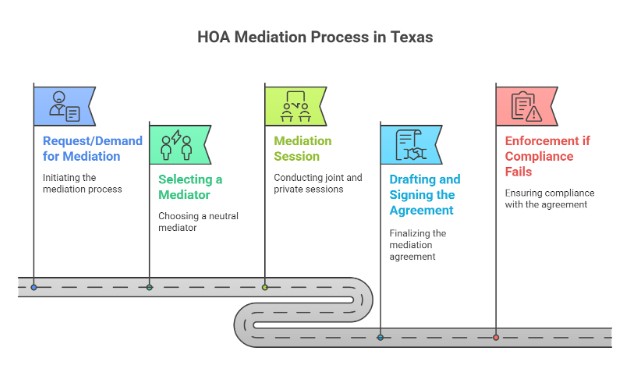Call Now For Service!
Originally published: October 2025 | Reviewed by Kim Torres

Living in an Austin neighborhood with a homeowners’ association means you agree to follow community rules.
However, let’s be honest, disputes often arise when homeowners and HOAs clash over issues such as enforcement, fees, or property changes.
Texas law gives homeowners some fundamental protections through mediation requirements, so you can resolve conflicts without emptying your wallet in court.
HOA mediation in Austin offers a private forum for both parties to discuss their concerns and reach mutually agreeable solutions.
It’s surprising how many people are unaware that Texas has laws governing when mediation must occur and how the costs are divided.
These rules can save you thousands compared to taking legal action in court. Texas homeowners have specific rights in HOA disputes, including access to fair mediation and legal safeguards.
If you know your rights before trouble starts, you’ll probably get a better outcome—and sidestep some nasty legal bills.

The Texas Property Code outlines the procedures homeowners’ associations must follow for handling disputes through alternative dispute resolution. HOAs must follow specific steps before they can take legal action against homeowners.
Texas Property Code Chapters 202-209 establish the rules governing property owners’ associations throughout the state. These chapters shape how HOAs operate and resolve disputes.
Chapter 202 essentially defines a property owners’ association as any group, whether incorporated or not, composed primarily of property owners and governed by official documents.
This chapter serves as the foundation for all HOA legal matters in Texas.
Key provisions include:
Chapter 209 focuses on alternative dispute resolution. HOAs have to try mediation or other ADR methods before suing homeowners for most covenant violations.
This law applies to associations formed after January 1, 2002, as well as to older associations that opt in. Older HOAs can follow these rules, but they are not required to do so.
Texas law requires HOAs to offer mediation or arbitration as a means to settle disputes before resorting to court. Homeowners can request these options when things become tense.
Mandatory ADR covers disputes about:
The HOA must send a written notice informing homeowners that they can request mediation. They must send this at least 60 days before suing for covenant enforcement.
Once you receive that notice, you have 30 days to request mediation. If you do, the HOA can’t sue until after the mediation or ADR process wraps up.
Usually, both parties share the mediation costs. The entire process should be completed within 30-60 days after the homeowner’s request, subject to variation.

HOA governing documents establish a legal pecking order for resolving disputes, and many associations include mandatory mediation requirements in their CC&Rs and bylaws.
Texas HOA law requires associations to follow their own documents when addressing conflicts or architectural issues.
The HOA documents hierarchy indicates which rules prevail in the event of a dispute. Declaration of Covenants, Conditions, and Restrictions (CC&Rs) typically appear at the top, followed by bylaws, and then board resolutions.
CC&Rs often outline the primary mediation requirements for a community. These rules bind all property owners, and you can’t just change them on a whim—it usually takes a big vote.
Bylaws outline the details of mediation clauses found in the CC&Rs. They spell out the timelines, what kind of notice is needed, and which disputes require mediation before you can sue.
Key Document Priorities:
Most Austin HOAs put mediation requirements in place for certain disputes. Architectural review disputes usually have to go through mediation before you can take legal action.
Typical Mediation Requirements:
Mediation clauses often give a 30-60 day window after formal notice. Sometimes, both sides split the mediator’s bill, but at other times, the loser pays.
You can’t just skip these mediation steps and run to court. Judges usually require both sides to follow the rules and may dismiss cases that don’t go through mediation first.
Resolve HOA conflicts quickly and fairly with Torres Mediation’s HOA dispute services. Protect your rights, save time, and find balanced solutions—contact us today to schedule your consultation.
If you’re ready to get started, call us now!
Texas law outlines the circumstances under which you and your HOA must attempt mediation before proceeding to court. Some disputes require it, others leave it up to you.
Texas Property Code says you have to try mediation in certain HOA disputes before suing. Covenant enforcement cases typically require mediation first if the HOA wishes to enforce deed restrictions or community rules.
Assessment and fee disputes also go to mediation if you’re fighting over charges. That covers special assessments, regular dues, and penalty fees you think are wrong or unfair.
Architectural control violations need mediation before court, too. These are the arguments over home changes, landscaping, or other items that the HOA says break the rules.
The HOA has 30 days to respond to your written mediation request. If they ignore you or say no, you can go straight to court.
Many HOA disputes can be resolved through mediation as a faster and more cost-effective alternative to court. Board election disputes often settle better this way if you’re questioning voting procedures or results.
Management company issues also lend themselves well to mediation. These include issues such as poor maintenance, ineffective communication, or contract disputes between the HOA and its management.
Neighbor-to-neighbor issues in HOA communities can go to mediation, even if the HOA isn’t directly involved. Property lines, noise, and pet complaints can all be resolved more efficiently this way.
Financial transparency disputes sometimes end up in mediation if homeowners want to review HOA records or budgets and the board refuses to share them.
| Dispute Type | Mediation Status | Before Court Filing | Typical Timeline |
| Covenant Enforcement | Required | Yes | 30-60 days |
| Assessment Disputes | Required | Yes | 30-60 days |
| Architectural Violations | Required | Yes | 30-60 days |
| Board Elections | Optional | No | 15-30 days |
| Management Issues | Optional | No | 15-45 days |
| Records Access | Optional | No | 15-30 days |
| Neighbor Disputes | Optional | No | 15-30 days |
Texas law gives homeowners several layers of protection during HOA mediation. These safeguards aim to ensure fair treatment, maintain the privacy of sensitive information, and provide homeowners with legal assistance when needed.
The Texas Alternative Dispute Resolution Act provides explicit protections for homeowners who participate in mediation with their HOA. Mediators and HOAs must adhere to these standards throughout the process.
Key Protections Include:
Mediators explain everyone’s rights before sessions start. Homeowners get clear info about their right to walk away from mediation at any point.
Texas Property Code Section 209 spells out procedures that protect homeowners. These rules keep HOAs from using mediation as a stalling tactic or dodging real complaints.
Enforcement mechanisms hold everyone accountable. If HOAs or mediators break the rules, they can face sanctions.
Everything said, written, or shared during HOA mediation stays confidential under Texas law. This privacy encourages honest conversation and keeps information from being used against homeowners later.
Confidentiality Rules:
These rules cover everyone involved—attorneys, witnesses, you name it. Homeowners get a safe space to air concerns without worrying about blowback.
Exceptions are rare. Courts only get access to mediation info if there’s criminal behavior or threats of violence.
Mediation offers a faster and less expensive alternative while maintaining confidentiality. Homeowners can be candid about their disputes without risking their legal standing.
Texas ensures that HOA mediators remain neutral and possess the necessary certifications. Homeowners work with professionals who have no stake in the outcome.
Mediator Requirements:
Certified mediators undergo thorough background checks and comprehensive ethics training. They must disclose any potential conflicts of interest before accepting a case.
If homeowners worry about a mediator’s neutrality, they can challenge the selection. Mediators also get special training on HOA law and homeowner rights.
Professional standards require mediators to guide the discussion without taking sides. They can’t offer legal advice or pressure anyone into a deal.
Texas law protects every homeowner’s right to have a lawyer during HOA mediation. Attorneys can join sessions, review documents, and give advice throughout.
Legal Representation Rights:
Homeowners can consult their lawyers before, during, or after mediation. This helps them understand their rights and what any agreement really means.
Knowing your rights makes a big difference in these situations. Legal counsel helps homeowners navigate the complex landscape of HOA rules and state laws.
Attorney-client privilege stays in place during mediation. Private chats between homeowners and their lawyers remain confidential, even if other mediation details come up later.
Most Austin HOA mediations split the costs equally between homeowners and the association, but the details can vary depending on the dispute and the mediator.
Mediation fees in Austin typically range from $150 to $500 per hour, depending on the complexity of the matter.
Austin mediation services typically split the costs 50/50 between the homeowner and the HOA. Each side pays its share directly to the mediator or service.
Some mediators require payment up front, while others bill after the session. Payment schedules depend on each mediator’s policy.
Common cost-sharing arrangements include:
The party requesting mediation typically handles scheduling and initial contact. But both sides must pay their share, regardless of who initiated the conflict.
It’s advisable to obtain a written agreement regarding cost-sharing before mediation commences. That way, nobody’s surprised by a bill later.
Austin HOA mediation costs depend on the mediator’s experience and the complexity of the case. Simple property disputes cost less than cases with multiple violations or legal issues.
Hourly rates usually look like this:
| Mediator Type | Cost Per Hour |
| Community mediators | $150-$250 |
| Attorney mediators | $300-$500 |
| Retired judges | $400-$600 |
Most sessions last 2 to 4 hours. Disputes about things like landscaping or parking often resolve within 2 hours.
More complicated cases—such as fines or architectural violations—can take 4-6 hours and may require multiple meetings.
There are sometimes administrative fees ($50-$100) or room rental fees ($25-$75 per hour). Some mediators roll these into their hourly rate, but not all.
Private mediation services tend to cost more than court programs. Still, private mediators often offer more flexible scheduling and have a deeper understanding of HOA issues.
Struggling with family disagreements beyond HOA issues? Torres Mediation offers family mediation that fosters constructive conversations and ensures fair outcomes. Let us help—schedule a confidential consultation with Torres Mediation now.
If you’re ready to get started, call us now!
Once properly signed, mediation agreements in Texas have the same legal force as court judgments.
The state’s civil practice code outlines how to enforce them, and breach remedies can include both monetary damages and court orders.
The Texas Civil Practice & Remedies Code treats mediated settlement agreements as binding contracts. If both sides sign and the mediator confirms the terms, the agreement is enforceable in court.
Key Requirements for Enforceability:
Texas courts treat these agreements like judicial orders. Homeowners and HOAs can’t just walk away from a mediated settlement without facing legal consequences.
The agreement needs language that says it’s binding. If terms are vague or incomplete, courts might not enforce those parts. Judges examine whether both parties understood what they were agreeing to when they signed.
To enforce a mediated agreement, one side must file a motion in the appropriate Texas court that covers the property.
Filing Process:
Challenging a mediated agreement isn’t easy. Acceptable reasons include fraud, duress, mutual mistake, or lack of mental capacity during mediation.
The challenging party has to file soon after discovering the issue. Courts rarely overturn a properly executed agreement unless there’s clear evidence of something going wrong in the process.
Texas courts offer several options if someone breaches a mediated HOA agreement. The injured party can seek monetary damages, specific performance, or both, depending on the circumstances.
Available Remedies:
Specific performance is commonly used in HOA disputes regarding property changes or rule compliance. Courts can order homeowners to complete agreed-upon actions or cease engaging in prohibited activities.
If someone willfully ignores an enforced mediation agreement, they could face contempt of court charges. That can mean fines or even jail time in extreme situations.
Mediation offers Austin homeowners significant advantages over resolving HOA disputes in court.
It saves money, reduces the time spent fighting, helps maintain neighborly relationships, and provides local options that are easier to access.
HOA mediation costs way less than taking a dispute to court. Homeowners usually pay a few hundred to a few thousand dollars for mediation.
Litigation can easily run into the tens of thousands. Court fees, attorney bills, and expert witnesses all add up quickly.
Mediation Cost Breakdown:
Litigation Cost Comparison:
Many Austin mediators offer sliding scale fees. Some community centers even provide low-cost options for HOA disputes.
Mediation wraps up disputes much faster than the court system. Most HOA mediations are completed within 2 to 6 weeks, from start to finish.
Court cases can take 12 to 24 months to reach trial. The backlog in Texas courts doesn’t help, either.
Homeowners can schedule mediation at a time that works for them— evenings, weekends, or at their convenience. No need to miss work for endless court dates.
Timeline Comparison:
Resolving issues quickly prevents disputes from escalating. Homeowners avoid months (or years) of stress and uncertainty while waiting for a court date.
Mediation helps maintain neighborly relations—something litigation often tends to destroy irreparably.
This collaborative process nudges both sides toward understanding, not just winning.
Court battles create winners and losers.
Neighbors who sue each other rarely reconcile afterward. The confidential nature of mediation ensures that disputes remain private and confidential.
Personal disagreements stay out of court records and neighborhood rumor mills. Mediators step in to help homeowners brainstorm creative solutions.
When both sides contribute to shaping the agreement, it usually holds more effectively than any court order.
Relationship Benefits:

The mediation process in Texas follows a clear sequence, from the first request to final enforcement.
It begins when both the homeowner and the HOA agree to mediation and typically proceeds through five main phases.
The homeowner or HOA can initiate the process by sending a formal written request for mediation.
This request should clearly outline the dispute and what they hope to achieve from it.
Many HOA rules require mediation before anyone heads to court.
Homeowners should review their CC&Rs and bylaws to determine if there are any mandatory mediation requirements in place.
Key elements to include in the mediation request:
The other party usually gets 30 days to respond.
If they refuse, the requesting party can often go straight to court.
A lawyer can be helpful at this stage, as they are familiar with the proper procedures and paperwork.
Both sides need to agree on a neutral mediator to guide the process.
The mediator should have a thorough understanding of HOA disputes and Texas property law.
Common methods for selecting a mediator:
Professional mediators typically charge between $200 and $500 per hour. Both parties split the cost, which encourages good-faith participation.
The mediator schedules the session and lays out the ground rules. A neutral mediator often sets up the first session within 2-3 weeks.
The mediation session kicks off with everyone in the same room.
Each side shares their position and any evidence to help the mediator get the full picture.
Joint session activities:
After that, the mediator holds private caucuses with each party.
These confidential chats allow people to discuss their strengths, weaknesses, and potential settlements openly and honestly.
The mediator moves between rooms, sharing information and proposals while maintaining confidentiality.
This back-and-forth continues until the parties reach an agreement or decide mediation isn’t working.
Most HOA mediations typically conclude within 4 to 8 hours, depending on the complexity of the issues.
When everyone agrees, the mediator helps draft a written settlement. This document outlines the responsibilities of each party and the corresponding deadlines.
Essential agreement components:
Both parties need to carefully read the agreement before signing.
Once signed, the mediation agreement becomes a legally binding contract in Texas.
The agreement should also outline procedures for addressing any future disputes related to the settlement.
Many accords include a clause for additional mediation if problems arise during implementation.
If one party fails to comply with the agreement, the other can request that the courts enforce it.
Texas courts usually enforce mediation agreements if they’re drafted correctly.
Enforcement options include:
The non-breaching party may sometimes recover attorney fees and costs if the agreement so stipulates.
Courts often award these fees to encourage people to stick to their settlements.
Some agreements establish additional steps before legal action, such as written notice requirements.
These give everyone another chance to work things out before heading back to court.
Torres Mediation truly stands out as Austin’s top choice for resolving HOA conflicts, thanks to its expertise and personal approach.
They’re committed to neutrality, offer free consultations, and bring specialized HOA experience—making them a solid partner for peaceful community solutions.
Torres Mediation has built a reputation as Austin’s go-to service for HOA dispute resolution.
Their focus on homeowner association matters makes them a better fit than general mediation services.
Key Advantages:
The firm focuses on fostering harmony within communities.
They get the unique dynamics between homeowners and their associations—it’s not always simple.
Torres Mediation understands that HOA disputes can damage neighborhood relationships irreparably.
They prioritize preserving community bonds while ensuring that everyone’s concerns are heard.
These testimonials show the consistency of Kim Torres’s approach: patience, fairness, legal insight, and a genuine dedication to helping people find common ground.
When disputes escalate, choose Torres Mediation divorce mediation services for a calm, cost-effective resolution. Start fresh with clarity and fairness. Contact Torres Mediation today to schedule your consultation.
Is mediation required for HOA disputes in Texas?
Yes. Under the Texas Property Code, mediation is required for certain HOA disputes, including the enforcement of deed restrictions and record access issues. For other conflicts, such as late fees or parking rules, mediation may be optional but is still strongly recommended before taking a case to court.
What are the legal protections for homeowners in Texas HOA mediation?
Texas law gives homeowners key protections in mediation, including confidentiality under the Texas ADR Act, the right to bring an attorney, and the use of a neutral mediator. These safeguards ensure that HOA boards cannot overreach or pressure homeowners unfairly during the mediation process.
How much does HOA mediation cost in Austin?
Most HOA mediations in Austin cost between $300 and $600, with fees usually split between the homeowner and the HOA. Costs vary depending on the mediator’s experience, length of the session, and complexity of the dispute. Mediation remains far less expensive than full litigation.
Are HOA mediation agreements legally binding in Texas?
Yes. Mediation agreements in HOA disputes are legally binding contracts under Texas law. If one party fails to comply, the agreement can be filed in court and enforced like any other contract. This makes mediation a secure and enforceable method for resolving HOA conflicts.
What types of HOA disputes qualify for mediation in Texas?
Common disputes that go to mediation include enforcement of deed restrictions, architectural changes, access to HOA records, parking rules, and assessment disputes. Mediation is beneficial in HOA cases because it allows both parties to negotiate practical solutions without escalating to costly litigation.
How long does an HOA mediation take in Austin?
Most HOA mediations in Austin last 2–4 hours, depending on the number of issues and the willingness of both sides to compromise. Some complex cases may require multiple sessions or take longer to resolve. Compared to litigation, which can take months, mediation provides a much faster resolution.
Can a homeowner refuse HOA mediation in Texas?
Homeowners generally cannot refuse mediation when it is required under the Texas Property Code or HOA governing documents. If mediation is optional, refusal is possible but not advisable. Courts in Austin often view mediation as a good-faith effort to resolve disputes and may expect parties to attempt it first.